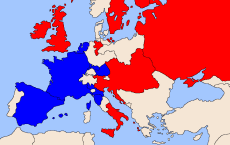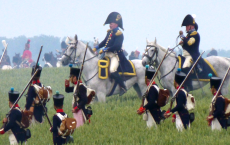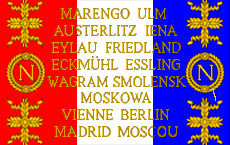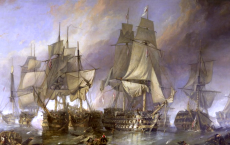The God of War
Napoleon, above all, was a soldier. He studied six years at Brienne military school and then at the prestigious Royal School of the Champ de Mars , in Paris . He had an innate intelligence of war, because, curiously, neither the strategy nor tactics were on the agenda of these institutions. He had the warrior's main quality: courage. And above all, he loved this job: one of his dearest memories is the day he received his officer's commission at "sixteen years and fifteen days" as he enjoyed to specify, even once he had reached the pinnacle of glory.
Fortunately for him, this exceptional soldier lived an era that was no less. Officer at sixteen, he became General at twenty-four and Commander-in-chief at twenty-seven. This meteoric career, brighter than any other, was not isolated, at a time when unknown guys without any support could blithely climb the hierarchical ladder and walk at full speed on the paths of glory.
The first years of Napoleon's career, at the languid pace of the ending Old Regime, allow us to imagine what might have been the life of this Corsican noble in other circumstances: a long alternation of leave and garrison life, ending by setting retirement as a lieutenant colonel.
The French Revolution decided otherwise, by leading and elevating him, thanks to the wars it recklessly triggered from 1792.
Some cannons pointed towards Avignon, the siege of Toulon, a dispersed rioting in Paris: this was only Napoleon's war experience when he took in Nice , in March 1796, the command of a ragged army on a theater of operations that the French rulers had conceived as secondary. Within days, he galvanized his soldiers, he imposed on his Major Generals (men of the caliber of André Masséna or Pierre Augereau, as experienced as little impressionable, older than him by age and by military rank), and he began the Campaign in Italy, that alone would be sufficient to secure his place in the pantheon of great captains.
Twenty years later, when the saga ended, Napoleon had waged war in Africa and Asia and crossed Europe from Madrid to Moscow, victoriously entering into nearly all its capitals, giving more battles than Alexander, Caesar and Hannibal together.
Triumphant during many years but finally defeated, he lost the support of the military high command, but never that of the bulk of the army. As his soldiers knew it well, he remained one of their own. Of course the first one, but essentially, their fighting fellow. One who they had elected a corporal on a victory night. One who, while he was Emperor, was still happy to share their food at night in the bivouac. One who used to sleep in the hut they had prepared for him to bits and pieces. One who lived the happiest evening of his existence among their flambeaus on the eve of the battle of Austerlitz, before becoming forever and ever, by this legendary victory, the "God of War", in the words of Carl von Clausewitz.




